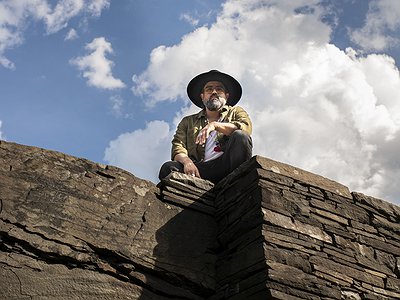Name: Cochemea Gastelum
Nationality: American
Occupation: Saxophonist, composer improviser
Current release: Cochemea's Vol. II Baca Sewa is out now via Daptone Records.
If these thoughts by Cochemea piqued your interest, visit him on Instagram, bandcamp, or his page on the Daptone Records website.
Cochemea: "I see myself as a human being that is connected to all things. I am Yaqui of the Pascua Yaqui of Tuscon, Arizona, Deer clan. My albums reflect these positions, but I also actively resist categorization in my work. I make things that come out of observations of my environment/experience, personal exploration, as well as narratives rooted in family histories. It’s is an ever evolving process. I’m not sure how or why I’m motivated to take these paths, I just am.
I am of course shaped by where I come from, my experiences and what has been passed down to me. All of these things directly influence my creative process, wether it’s on a conscious level or not.
One of the ways colonization operates, is to sever cultural ties, language and practices through oppression and violence. I can only speak for myself, but in my family, the sense who we are and where we come from was passed down, even in my indigenous name. I think transmission happens on a genetic and spiritual level, as well.
~
I think too often, there is an attitude of extraction when it comes to specifically, Indigenous art, music and culture without any kind of protocol observed or permission given, which is really an extension of colonialism and capitalism. This can cause real harm. One has to ask “why am I doing this?” “who benefits?” “Is this self seeking for personal gain or for the community?” “does this belong to me?” I think these kinds of questions need to be asked and sat with deeply.
One thing I think to realize, is that we are all connected to one another and we are not separate from nature, no matter what we are told.
~
I was fortunate to be raised around a lot of different kinds of music, including Jazz, since early childhood. I was already familiar with Charlie Parker, Lester Young and Wes Montgomery long before I picked up the saxophone, as my mother would play their records frequently, and had a deep reverence for these artists. My father also played Jazz guitar, so I suppose you could say a lot was passed down. Music always felt important and was respected.
I don’t really think of my records as Jazz or any one category, though. Of course I’ve studied and been very influenced by Jazz, but I listen to and am influenced by, a wide range of music and artists. I like to incorporate different rhythmic and melodic ideas and see how they work together with different narrative structures.
I love the interplay and melodic conversation between the drums and horns on Sabu Martinez's Afro Temple. I’ve always been drawn to rhythm (I actually started on drums before sax) and that sound seemed like the right setting for some of the thematic ideas and narratives I was working with and imagining.
~
I think music can have an ephemeral/transitory effect, but for me, if it does its job, it can affirm difference, harmony and unity all at the same time. Wether music heals or hurts depends on context and also what the listener brings to it. Healing takes place on a personal level, so everyone is different. For me, the act of creating is healing. The music on my albums, ultimately, aims for some kind of transformation in the process. I choose not to be trauma focused for the most part.
Deep Listening is where we start and all things follow after that."

